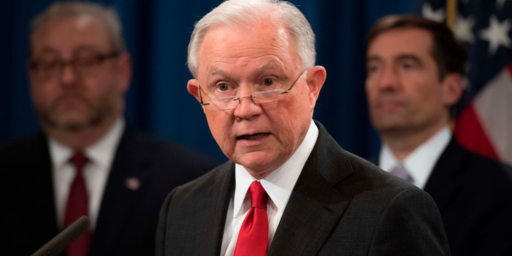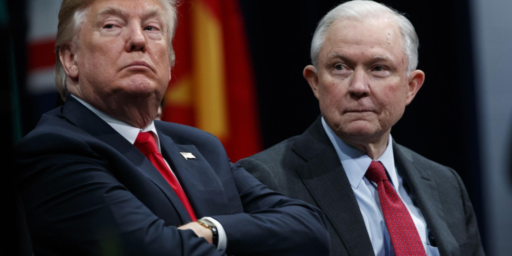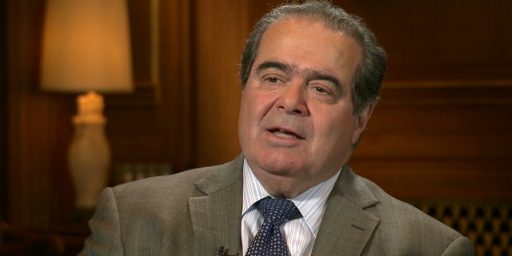Bush Judicial Appointments
Two interesting, related op-eds appear in today’s papers on the subject of President Bush’s nominations to the bench.
Northwestern University law professor Steven Lubet makes the liberal case for an Antonin Scalia chief justiceship in Newsday.
The prospect of Scalia as chief justice sends most Democrats into a near panic, fearing that a court dominated by his jurisprudence would be a disaster for progressive concerns such women’s rights, workers’ rights, environmental protection and a host of other mainstream interests. Many liberal advocacy groups are ready to demand the filibuster of a possible Scalia appointment, which is the only way he could be defeated in the Senate. But that would be a mistake. The filibuster is a scorched-earth tactic that cannot be used endlessly, and it would be better to hold it in reserve than to use it in Scalia’s case. In fact, liberals (like me) might almost welcome Scalia’s nomination as chief, for at least the following reasons:
It won’t make much difference. While the title is impressive, the chief justice actually wields relatively little power. In addition to substantial administrative responsibilities, and some ceremonial duties, the additional authority of the chief is limited. He presides over presidential impeachments, he presents an annual State of the Judiciary report, and he sets the agenda for the justices’ conferences. When it comes to deciding cases, however, the chief only has one vote, the same as every other justice. (He also assigns opinions in cases where he is in the majority, but he has no clear- cut influence over how they are written or whether the other justices concur.) Whether or not he becomes chief justice, Scalia will remain on the court, so his elevation would have no great impact on decisions.
He won’t be very effective. Some chief justices, such as Earl Warren, have been masterful coalition builders, persuading colleagues to join them in landmark rulings. That sort of leadership can occasionally change the direction of the entire court, but it requires political skills that Scalia has never displayed. Instead, Scalia is famous for his sharp intellect and his sharper pen. He does not take well to disagreement, even from the other justices, whom he has often criticized in stinging terms. In one case, for example, he referred to Justice Sandra Day O’Connor’s position as “irrational.” In another, he accused six of his colleagues of “taking sides in the culture war” by adopting the “homosexual agenda.” His stewardship would likely lead to a fractured court, which could be the liberals’ best hope to avoid an out-and-out shift to the extreme right.
Lubet is right about the nature of the chief justiceship and may well be correct as to Scalia’s temperament. Scalia would be only slightly more able to shape the Court’s opinions as Chief. His main power in that regard would be to assign the writing of opinions in which his is in the majority. If Bob Woodward is to be believed, former Chief Justice Warren Burger actually changed his vote on occasion in order that he might exercise that prerogative, assigning a more moderate justice to write the opinion to mitigate the damage it would do. One doubts Scalia would do that.
The other major advantage the Chief has is the ability to speak out on his view of the courts and their interplay with the elected branches. Scalia’s skills would be an asset in this aspect of the job, but there’s no reason to think Scalia’s views significantly differ from Chief Justice Rehnquist’s.
Senator Jeff Sessions argues in USA Today,
President Bush was right to say he will renominate the 20 superb judicial candidates who were denied floor votes by an unprecedented use of the filibuster. Few would dispute that the obstruction of Bush nominees played to the political advantage of Bush and Republican Senate candidates and was an important factor in Republicans’ picking up four seats. The leader of the Democratic obstructionism, Tom Daschle, lost his seat. And the one Democrat who won in a competitive race, Ken Salazar of Colorado, pledged not to filibuster nominees.
Whatever one thinks of gay marriage, partial-birth abortion or the Boy Scouts, voters understand that democracy is diminished when un-elected judges set social policy for America. Good judges are not partisans, but fair arbiters of disputes. Bush correctly believes that judges should show restraint and not manipulate court opinions to promote political agendas.
Most important, the 20 individuals Bush intends to renominate are not divisive candidates. Bill Pryor has the support of every major political figure in Alabama, black and white, Republican and Democrat. Texas Supreme Court Justice Priscilla Owen was endorsed by every major newspaper in Texas. And California Supreme Court Justice Janice Rogers Brown was re-elected with a higher percentage of votes than any other judicial candidate in California.
Obviously, it’s these nominees were in fact “divisive,” given that they were filibustered. Sessions is right, though, if he means simply that they are well within the mainstream of American judicial opinion. Not all nominees who are qualified based on experience and intellect should be confirmed. The case of Lani Guinier comes to mind. But all nominees deserve and up-or-down vote.






Obviously, it’s these nominees were in fact “divisive,” given that they were filibustered.
Had they not been filibustered, every one of them would have been confirmed. Although Harry Reid claims they were “rejected,” in fact all that has happened has been that actual votes on confirmation have been prevented. Just thought I’d keep that fact in the conversation.
Never before have judicial nominees been filibustered who would have been confirmed had they come to an up-or-down vote.
Sure. But a filibuster requires 40% of the Senate to sustain. I’d term any issue why has 40 or more Senators in staunch opposition as “divisive.”